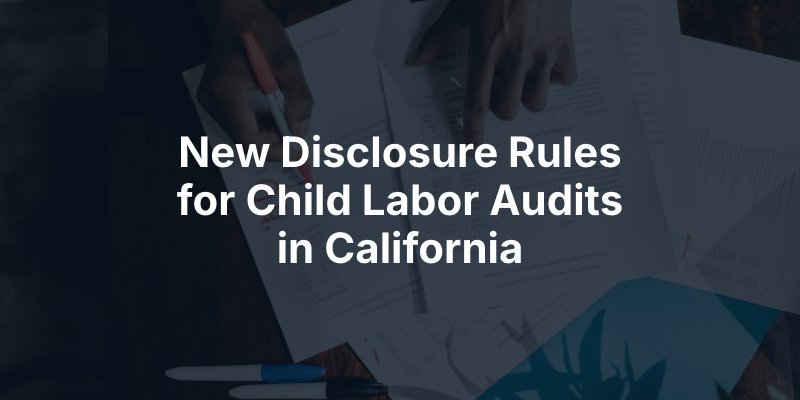Effective January 1, 2025, a new California law (AB 3234) requires certain employers to publicly disclose information regarding child labor audits. The goal is to shed light on whether companies are actively preventing and identifying the use of child labor within their operations and supply chains. An Orange County employment law attorney can help businesses understand their compliance obligations and advise employees on their rights under this new law.
The legislation, part of California’s amended labor code, requires businesses meeting specific thresholds to report annually on child labor due diligence efforts. These disclosures must be accessible on the company’s website and filed with the California Department of Industrial Relations (DIR). Businesses must disclose:

Covered entities include businesses with gross receipts over $100 million that operate in California and manufacture goods or sell products made outside the United States. This provision primarily affects large companies with international supply chains.
Employers must now review their current supply chain practices. Those without formal auditing mechanisms in place will need to establish them. For many, this will involve hiring independent auditors, setting compliance benchmarks, and building corrective action plans in the event of violations. Businesses that fail to submit the required disclosures may face penalties and reputational harm.
These new disclosure rules will also likely increase collaboration with suppliers. Companies must ensure that their contractors and subcontractors understand California’s requirements. Suppliers that cannot provide child-labor-free certifications or resist transparency will present serious risks.
AB 3234 responds to growing public concern over the resurgence of child labor in both domestic and international supply chains. Reports from the U.S. Department of Labor and other watchdog organizations have documented child labor in agriculture, textile production, food processing, and warehousing. By mandating public disclosures, the law empowers consumers, investors, and advocacy groups to hold companies accountable.
The new child labor disclosure requirements do not explicitly authorize lawsuits for failure to comply, but workers may cite an employer’s failure to conduct or disclose audits as evidence of negligence or a pattern of labor violations. For example, if underage workers are found within a supply chain, plaintiffs can argue that the company ignored warning signs or failed to implement reasonable oversight. Advocacy groups may use the disclosures—or the absence of them—in legal complaints, petitions for injunctive relief, or complaints filed with administrative bodies.
The State of California may also take direct enforcement action through the Department of Industrial Relations (DIR) or the Attorney General’s Office. Both entities have authority to investigate violations, assess penalties, and issue public reports identifying non-compliant companies. Repeated failures to comply with the disclosure requirements may also expose companies to regulatory audits, contract disqualifications, or enhanced penalties under existing labor laws.